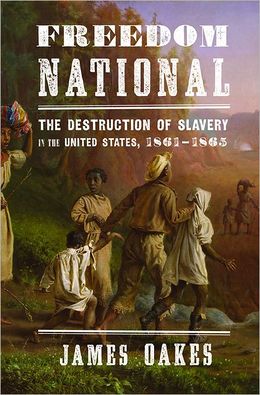Another reason why an amendment banning pollution will pass and change culture
Regular readers know I’m learning about slavery and abolition as models for changing global culture.
I’m reading a wonderful book Freedom National, by James Oakes, who gave me a copy after we recorded a podcast episode in person at his office. It’s being edited and will go live in January.
The book describes an argument against abolition before the Civil War: after blacks were freed they would be able to vote. Today we see the right to vote as a reason to free people, not enslave them.
Likewise, one day we will see all the consequences people fear of banning pollution as reasons for it.
As long as I’m mentioning the book, which I recommend, I’ll share a few words on it:
Freedom National won the Lincoln Prize for recounting the story of American abolitionists transforming thirteen slave colonies, which become thirteen slave states, into the Thirteenth Amendment, permanently banning chattel slavery.

Before Freedom National, school had taught me of the Civil War and the Emancipation Proclamation, but little more than a few broad highlights of American abolitionism. More recently I’d read podcast guest Manisha Sinha’s The Slave’s Cause, that detailed that history as well as podcast guest Adam Hochschild’s Bury the Chains, about British abolitionism. I had thought England led the United States, having banned the slave trade in 1807 and slavery in 1833. Evidently, major parts of abolitionism began here, including Vermont creating the first constitution incorporating abolition in 1777, followed by Pennsylvania’s first Act for the Abolition of Slavery in 1780, signed near where I was born and raised.
Freedom National told the story of taking many generations of interpreting the U.S. Constitution as rooted in freedom with exceptions for slave-owning states that opponents of slavery expected to wither away, not anticipating Eli Whitney’s cotton gin and the power it gave cotton growers. In a context where many considered slavery a state issue immune from federal influence, generations of legal and political theorists developed a legal framework with goals of emancipating slaves, leading slaveholders to choose to free their slaves, and abolish slavery, from outside the states.
How crazy must they have seemed to everyone, trying to build a case to outlaw something that existed since before history, that seemed natural, normal, even good and right. Yet the signs of slavery’s wrongness were there, principally that the slave owners wouldn’t choose to be slaves themselves, combined with Do Unto Others As You Would Have Them Do Unto You.
We are their future generations and we look back with admiration and gratitude at those who risked their reputations and careers, facing ridicule and scorn, to develop those theories that seemed crazy. They enabled Abraham Lincoln and his party during the Civil War to emancipate slaves, lead slave states to become free, and pass the Thirteenth Amendment. Without the earlier theorizing, the war may have ended without abolishing slavery or even emancipating that many slaves. Their then-crackpot ideas helped create an absolute foundation of our culture.
Read my weekly newsletter

On initiative, leadership, the environment, and burpees
Pingback: Waking before the alarm, writing in the Dark » Joshua Spodek